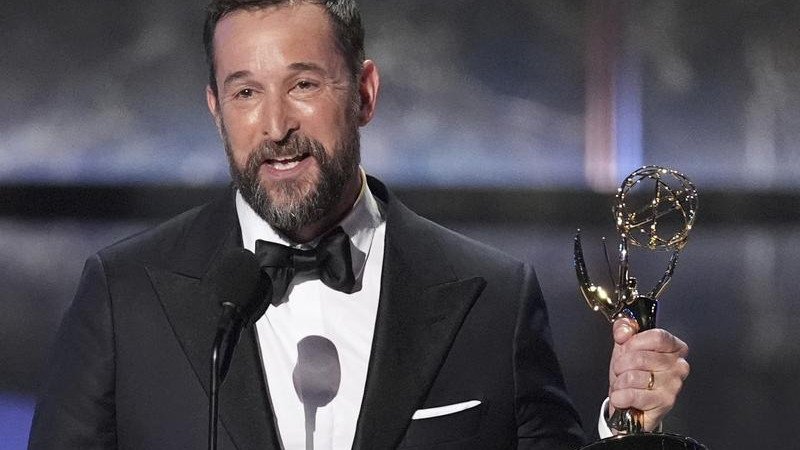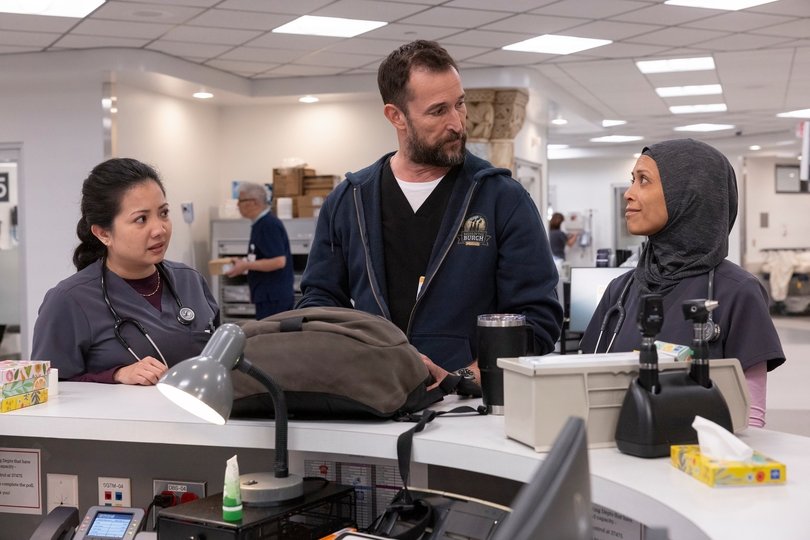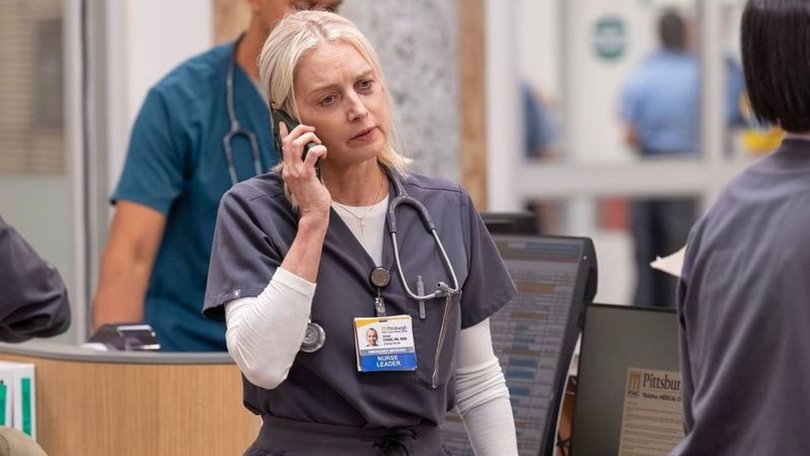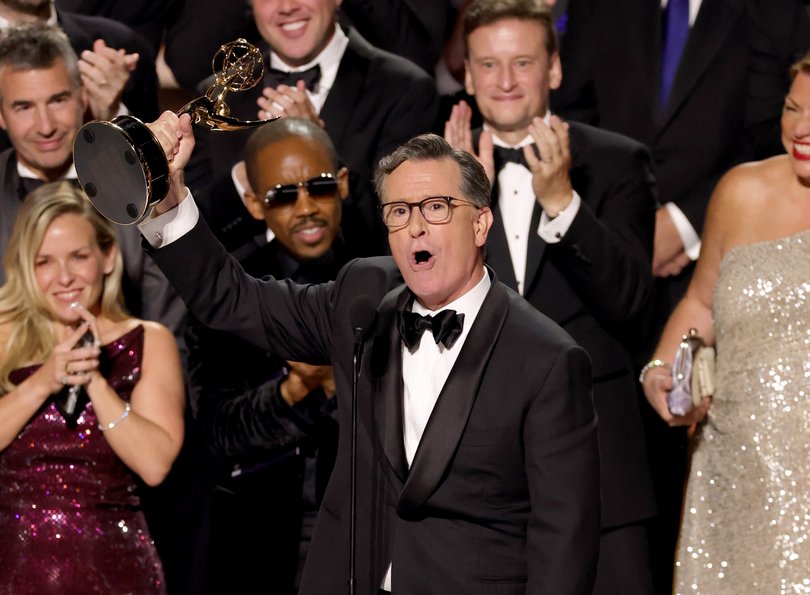Emmy winners 2025: The Pitt signals a re-embrace of old-school TV that actually wants to be TV
The Pitt winning big at this year’s Emmys signals that old-school TV formats still has great value for audiences, for the industry and as art.

It was meant to be Severance’s year. The acclaimed Apple TV+ drama is beloved for its twisty mystery box and its stylish production design.
Severance is properly, creatively ambitious TV that never seemed to be held back by any notions of whether it was too high-brow or cerebral for a mass audience. It wasn’t looking to be for everyone.
Despite its tally-leading 27 nominations, Severance missed out on most of the big awards come Emmys night. It lost writing to Andor, directing to Slow Horses and lead actor, supporting actress and drama series to The Pitt.
Sign up to The Nightly's newsletters.
Get the first look at the digital newspaper, curated daily stories and breaking headlines delivered to your inbox.
By continuing you agree to our Terms and Privacy Policy.To call The Pitt a spoiler is not quite right. With 13 nominations, The Pitt was no upset winner, and in recent weeks, the race in the drama categories had closed considerably between the two frontrunners. Most prognosticators pegged it as a competitive heads-up between the two series.
If Severance was going to lose to someone (and become the first most nominated series in its year to not take home the big one since 2017, when Westworld lost to The Handmaid’s Tale), it might as well be The Pitt. There’s absolutely no shame in it.

Here’s the thing about The Pitt. It’s bloody marvellous TV. It’s also … TV, unabashedly so. It’s not one of those “oh, it’s more like an eight-hour movie” types who seemed almost embarrassed to be working in the medium.
If you’re part of the tea-leaf reading brigade, as TV executives who commission shows should be, there’s much to be gleaned from The Pitt’s triumph. Its win at the Emmys signals a re-embrace of old-school TV.
Traditional doesn’t mean regressive — or it doesn’t have to.
While great bounds have been made in pushing the limits of what a TV show could be in terms of how it’s structured, its tone, its subject matter or its budget, there remains an appetite for familiar formats.
When it comes to procedurals, things like NCIS or canned-laughter sitcoms come to mind, and no one is suggesting the entirety of TV should be predictable and mind-numbing.
But there is also great value in procedural titles working in tried-and-true genres such as a medical drama, as The Pitt does. The difference is in what you do within it and, as always, if the writing, performances and craft are great, it doesn’t matter what the sandbox is.
The Pitt is a playbook on how it’s done — and done well.

The series had started as a germ of an idea from Noah Wyle, who had wanted to bring back his character from ER, John Carter. He said so in an email to producer and showrunner John Wells, according to The New York Times, writing that it would be a “beautiful new song in an old and familiar key”.
What happened next is still subject to an ongoing lawsuit from the Michael Crichton estate against Warner Bros TV who alleges copyright infringement and that The Pitt is a stealth ER sequel.
The parties had been involved in discussions to bring back ER and John Carter, but the negotiations fell through and Wells, Wyle and Warner Bros pivoted to what became The Pitt. Instead of Chicago, the show was now set in Pittsburgh, and Wyle was now portraying an experienced doctor named Michael Robinavitch, nicknamed Dr Robby.
The Pitt is also structured differently to ER – more like the post-9/11 thriller 24 than ER. Every episode of the season takes place in real-time over one hour in a shift, adding up to 15 hours across its 15 episodes.
That it had received a 15-episode order for its first season almost never happens now in an era where streaming has standardised the six or eight, occasionally 10-episode run. A high episode count harks back to the days of broadcast dominance.
Even late 90s/2000s HBO shows used to consist of 13 episodes, as did Netflix’s first originals.
The Pitt used that time to build its world out, and established its characters not through lazy exposition or shortcuts but through good storytelling.
We learnt who they were from how they interacted with their colleagues and their patients over time. This was a workplace drama that feels lived in, as if it existed before the cameras turned on and will continue to as the credits rolled.

By the time the climactic 12th episode came on, the absolute chaos of a mass casualty event inundating the emergency room, the stakes were higher because we already understood who these characters were, and what they were mentally going through during that shift.
Other than Wyle, the large ensemble cast was made up of journeyman character actors or relative newcomers playing the doctors, nurses and students, such as Australia’s Shabana Azeez and Katherine LaNasa, who won an Emmy today for her performance, so it didn’t rely on starpower to attract and retain viewers.
Wyle, who won his first Emmy today after five nominations in the 1990s, of course, was a drawcard, as was Wells, who was known for his involvement in successful broadcast dramas such as ER and The West Wing. These were two people who know how to make TV, while creator R. Scott Gemmill cut his teeth on ER and JAG.
Even though it had been commissioned for a streamer – HBO Max – it was released according to a broadcast timetable. After the initial double-episode drop, it came out once a week, and during a US primetime slot, instead of at midnight as Netflix does for all its titles.
That allowed the show to build buzz and audiences. Warner Bros claimed The Pitt had 13 weeks of consecutive growth, and that its first episode had, over time, crossed the 16 million US viewers threshold.
Audiences were discovering it because of reviews and word-of-mouth, and after its 13 Emmy nods in July, it had a 200 per cent bump in viewership compared to the previous two weeks, according to data company Luminate, the highest of any nominated shows.
Streaming and premium cable has changed and evolved the art of television over the past two decades, but there is always room for a more old-school format, as long as it’s done as well as The Pitt.
Which is not to say the Emmy voters have done a 180, it’s more that there’s a recognition that there’s no need to eschew what might have been pegged as yesterday’s news. Albeit, out of the 21 shows nominated for best series across drama, comedy and limited, only one was a network show – Abbott Elementary.
But The Pitt reframes what the audience – and the industry – might delineate as traditional TV and streaming.
The other big winners of the Emmys were two shows that may not have been made under the old broadcast regime. Adolescence won every category it was nominated in at the primetime ceremony, picking up six gongs – limited series, actor for Stephen Graham, supporting actor for Owen Cooper, supporting actress for Erin Doherty, writing and directing.
The zeitgeist-penetrating British show captured the cultural and political conversation when it was released earlier this year. The series explored the fallout from the arrest of a teenage boy for the murder of a schoolgirl and how toxic masculinity and the online manosphere was spreading its influence to young men and boys.
It was a gut-punch of a show, terrifying to both parents and the child-free. It was also lauded for its technical achievements, filming each of its four episodes in one continuous shot as a way to portray the uncomfortable intimacy of the situation, giving the viewer no reprieve from its horrors.

Netflix will be pleased with its haul, and after the success of Baby Reindeer across the same categories last year, will look to its UK division to keep delivering from that side of the world.
Apple TV+ also had a fantastic year with its biggest ever Emmys tally of 22 awards, second only to HBO and Netflix’s equal first with 30 gongs each.
Despite underperforming on the main night, Severance still won eight Emmys while 13 of Apple’s 22 awards came from The Studio, its genuinely laugh-out-loud comedic satire/love letter to Hollywood.
Co-created, co-written, co-directed and starring Seth Rogen, the series is centred on a well-meaning Hollywood executive who wants to fulfil his creative ambitions in making the kinds of serious films he fell in love with as a kid, but finds himself increasingly compromised as commercial realities force his hand to greenlight shows such as blockbusters based on intellectual property including the soft drink brand Kool-Aid.
The Studio won four awards on the night, with Rogen setting a record as the only person to personally win in the series, writing, producing and lead acting categories. He becomes the fourth person ever to win four gongs in one night – the others being Schitt Creek’s Dan Levy, Marvelous Mrs Maisel’s Amy Sherman-Palladino and Making a Murderer’s Moira Demos, although they did it with different combinations of categories.
The Studio picked up nine other Emmys at the Creative Arts ceremony, totalling 13 overall, which is the most a comedy series has won for its first season, breaking a record set by The Bear.

The Bear turned out to be one of the big losers of this year, winning nothing from its 13 nominations while The White Lotus only won one out of its 23 nominations – ironically, for the rejigged theme song everyone on the internet claimed to passionately hate.
Across the ceremony, a slate of other shows picked up an award here and then, with the voting body sharing the love (it’s so boring when the same three shows win everything) – Andor won for drama writing, The Penguin’s Cristin Milioti won supporting actress in a limited series, Slow Horses won for drama directing, Hacks won two acting gongs for Jean Smart and Hannah Einbinder while the little-watched but beloved Somebody Somewhere claimed an upset win for Jeff Hiller in supporting actor in a comedy.
But the person who triggered the most rousing standing ovations (yes — ovations, plural) was Stephen Colbert, who added to his Emmys shelf with his first win for The Late Show.
Colbert’s late-night show was cancelled two months ago, ostensibly for financial reasons but under a cloud that it was politically motivated as parent company Paramount tried to get government approval for its then-pending merger deal with Skydance.
Colbert was and still is a fervent critic of Donald Trump and his administration, and had publicly called out his own network, CBS, for capitulating to a Trump lawsuit which involved a $US16 million ($24m) settlement.
He said in his acceptance speech, “I have never loved my country more desperately. God bless America, stay strong, be brave and if the elevator tries to bring you down, go crazy and punch a higher floor”.


